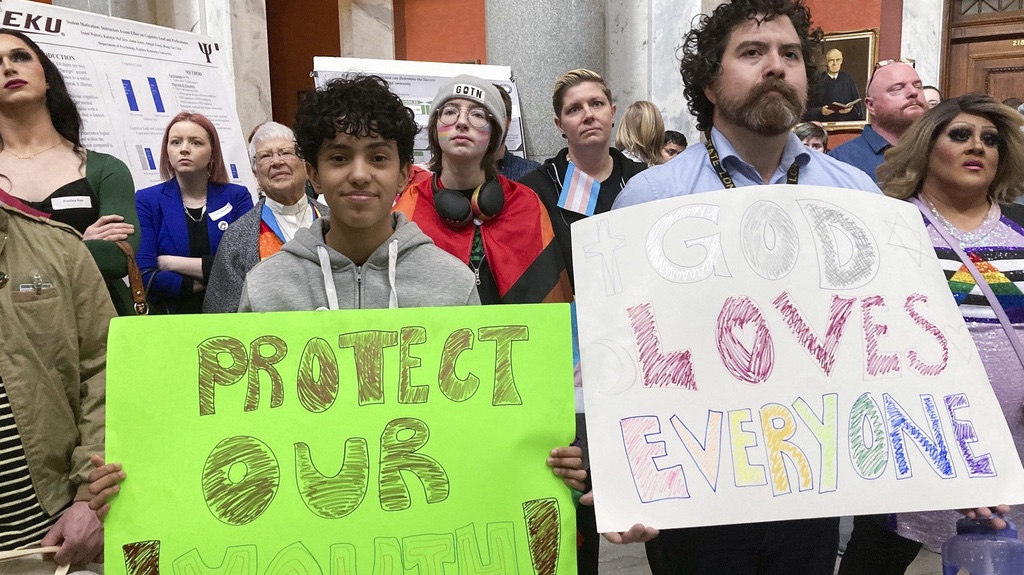January 12, 2010
Ted Olson Makes a 'Conservative Case for Gay Marriage'
Kilian Melloy READ TIME: 5 MIN.
Ted Olson, the conservative lawyer who represented presidential candidate George W. Bush before the Supreme Court in Bush v. Gore in 2000, has flummoxed the political right by taking up a challenge to the constitutionality of California's anti-gay voter initiative amendment, Proposition 8, which in November of 2008 rescinded the existing right of gay and lesbian families in that state to marry.
Olson, who served Ronald Reagan as Assistant Attorney general before serving as George W. Bush's Solicitor General, sought to explain himself in an essay titled "The Conservative Case for Gay Marriage" that appeared in the Jan. 18 edition of Newsweek, and which was posted at newsweek.com on Jan. 9.
Subtitled, "Why same-sex marriage is an American value," the essay addressed a question Olson knew to be on the minds not only of conservatives, but also liberals: "How could a politically active, lifelong Republican, a veteran of the Ronald Reagan and George W. Bush administrations, challenge the 'traditional' definition of marriage and press for an "activist" interpretation of the Constitution to create another 'new' constitutional right?
"My answer to this seeming conundrum," Olson's essay continued, "rests on a lifetime of exposure to persons of different backgrounds, histories, viewpoints, and intrinsic characteristics, and on my rejection of what I see as superficially appealing but ultimately false perceptions about our Constitution and its protection of equality and fundamental rights.
"Many of my fellow conservatives have an almost knee-jerk hostility toward gay marriage," Olson noted. "This does not make sense, because same-sex unions promote the values conservatives prize. Marriage is one of the basic building blocks of our neighborhoods and our nation. At its best, it is a stable bond between two individuals who work to create a loving household and a social and economic partnership."
Olson addressed criticisms that conservatives have leveled at gays who seek marriage rights. Conservatives charge that gays seek to place their own "pleasure" above family and the needs of children; Olson boiled down the sentiment of family as central to marriage, and re-stated the idea that marriage is central to society--but from the perspective that allow gays to participate in marriage will strengthen society, not endanger it.
"Marriage requires thinking beyond one's own needs," noted Olson. "It transforms two individuals into a union based on shared aspirations, and in doing so establishes a formal investment in the well-being of society. The fact that individuals who happen to be gay want to share in this vital social institution is evidence that conservative ideals enjoy widespread acceptance. Conservatives should celebrate this, rather than lament it.
"Legalizing same-sex marriage would also be a recognition of basic American principles, and would represent the culmination of our nation's commitment to equal rights," Olson continued. "It is, some have said, the last major civil-rights milestone yet to be surpassed in our two-century struggle to attain the goals we set for this nation at its formation.
"This bedrock American principle of equality is central to the political and legal convictions of Republicans, Democrats, liberals, and conservatives alike," Olson argued, before going on to offer a very brief overview of the history of civil equality in America. "The very idea of marriage is basic to recognition as equals in our society," Olson concluded; "any status short of that is inferior, unjust, and unconstitutional."
Olson acknowledged that the courts have tended to see marriage from a vantage that assumes it to exist between people of opposite genders; "But while the Supreme Court has always previously considered marriage in that context," he wrote, "the underlying rights and liberties that marriage embodies are not in any way confined to heterosexuals."
Writing that the reasons offered for denying gay families marriage equality are "not very persuasive," Olson addressed some of the rationales espoused by the anti-gay side of the debate. One argument cites tradition, Olson noted, "But simply because something has always been done a certain way does not mean that it must always remain that way. Otherwise we would still have segregated schools and debtors' prisons," he wrote.
The Procreation Argument
Olson also noted that those who seek to curtail the rights of gay families suggest that heterosexual procreation would somehow be impacted if gays were allowed access to the protections and obligations of marriage. "But that is plainly not the case," he wrote. "Preventing lesbians and gays from marrying does not cause more heterosexuals to marry and conceive more children. Likewise, allowing gays and lesbians to marry someone of the same sex will not discourage heterosexuals from marrying a person of the opposite sex. How, then, would allowing same-sex marriages reduce the number of children that heterosexual couples conceive?"
Added Olson, "What's more, it is pernicious to think marriage should be limited to heterosexuals because of the state's desire to promote procreation. We would surely not accept as constitutional a ban on marriage if a state were to decide, as China has done, to discourage procreation." Added Olson, "The simple fact is that there is no good reason why we should deny marriage to same-sex partners. On the other hand, there are many reasons why we should formally recognize these relationships and embrace the rights of gays and lesbians to marry and become full and equal members of our society."
Addressed religious conservatives' claims that gays "choose" their sexual orientation, Olson wrote, "Science has taught us, even if history has not, that gays and lesbians do not choose to be homosexual any more than the rest of us choose to be heterosexual. To a very large extent, these characteristics are immutable, like being left-handed. And, while our Constitution guarantees the freedom to exercise our individual religious convictions, it equally prohibits us from forcing our beliefs on others.
"I do not believe that our society can ever live up to the promise of equality, and the fundamental rights to life, liberty, and the pursuit of happiness, until we stop invidious discrimination on the basis of sexual orientation."
Olson recounted that he has been the target of anti-gay conservatives who feel he is betraying their ideology. "I have certainly heard anger, resentment, and hostility, and words like 'betrayal' and other pointedly graphic criticism," he wrote. "But mostly I have been overwhelmed by expressions of gratitude and good will from persons in all walks of life, including, I might add, from many conservatives and libertarians whose names might surprise.
"I have been particularly moved by many personal renditions of how lonely and personally destructive it is to be treated as an outcast and how meaningful it will be to be respected by our laws and civil institutions as an American, entitled to equality and dignity," Olson wrote. "I have no doubt that we are on the right side of this battle, the right side of the law, and the right side of history."
Olson is joined in the case against Prop 8 by David Boies, who was his legal adversary in Bush v. Gore.
Kilian Melloy serves as EDGE Media Network's Associate Arts Editor and Staff Contributor. His professional memberships include the National Lesbian & Gay Journalists Association, the Boston Online Film Critics Association, The Gay and Lesbian Entertainment Critics Association, and the Boston Theater Critics Association's Elliot Norton Awards Committee.







